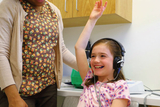
What is tinnitus?
Children may say they hear ringing, buzzing, hissing, clicking or something else in their ear. Tinnitus is the perception of sound in one or both ears that is not related to external sounds. It may be high or low in pitch, and continuous or just occasional. This is actually a very common auditory perception, and some children may not even mention experiencing it.
How does tinnitus affect children?
It is estimated that between 10 to 20 percent of children experience tinnitus. Most children with tinnitus have typical hearing, but it can also be experienced in children with hearing differences. Tinnitus rarely causes enough distress that it interferes with daily activities, such as sleep or concentration in school. There are many possible causes of tinnitus but overall it is generally a normal phenomenon and not a sign of anything else that is wrong.
Should I have my child evaluated if they’re experiencing tinnitus?
If your child is experiencing tinnitus, your primary care provider may refer them to an otolaryngologist (ear, nose and throat specialist) and/or an audiologist (hearing healthcare specialist) to have their tinnitus evaluated. These specialists may conduct the following:
- Physical exam and thorough medical history
- Questionnaires/surveys regarding your child’s symptoms and the impact on their daily life
- Hearing test, physiologic tests of middle and inner ear function
Audiologists may also do other specialized tests or questionnaires to help explain your child’s tinnitus to them and help with management strategies.
What can be done to help your child at home?
Your audiologist may give you ideas of ways to help your child at home. There are different sounds that can help reduce stress (e.g., ocean waves, white noise, instrumental music). Simply having a fan on may help. It is also recommended to ensure safe listening levels of sounds (e.g., personal listening devices, concerts), as listening at high levels can increase their risk of tinnitus and noise-induced hearing loss.
Next steps
At CHOP, we are always here to help! Learn more about tinnitus and call 1-800-551-5480 if you would like to schedule an appointment with an audiologist.
Featured in this article
Specialties & Programs
What is tinnitus?
Children may say they hear ringing, buzzing, hissing, clicking or something else in their ear. Tinnitus is the perception of sound in one or both ears that is not related to external sounds. It may be high or low in pitch, and continuous or just occasional. This is actually a very common auditory perception, and some children may not even mention experiencing it.
How does tinnitus affect children?
It is estimated that between 10 to 20 percent of children experience tinnitus. Most children with tinnitus have typical hearing, but it can also be experienced in children with hearing differences. Tinnitus rarely causes enough distress that it interferes with daily activities, such as sleep or concentration in school. There are many possible causes of tinnitus but overall it is generally a normal phenomenon and not a sign of anything else that is wrong.
Should I have my child evaluated if they’re experiencing tinnitus?
If your child is experiencing tinnitus, your primary care provider may refer them to an otolaryngologist (ear, nose and throat specialist) and/or an audiologist (hearing healthcare specialist) to have their tinnitus evaluated. These specialists may conduct the following:
- Physical exam and thorough medical history
- Questionnaires/surveys regarding your child’s symptoms and the impact on their daily life
- Hearing test, physiologic tests of middle and inner ear function
Audiologists may also do other specialized tests or questionnaires to help explain your child’s tinnitus to them and help with management strategies.
What can be done to help your child at home?
Your audiologist may give you ideas of ways to help your child at home. There are different sounds that can help reduce stress (e.g., ocean waves, white noise, instrumental music). Simply having a fan on may help. It is also recommended to ensure safe listening levels of sounds (e.g., personal listening devices, concerts), as listening at high levels can increase their risk of tinnitus and noise-induced hearing loss.
Next steps
At CHOP, we are always here to help! Learn more about tinnitus and call 1-800-551-5480 if you would like to schedule an appointment with an audiologist.
Contact us
Department of Audiology